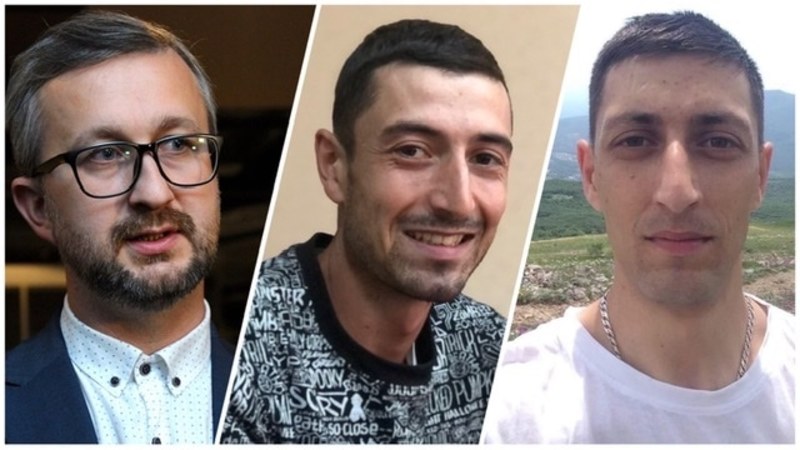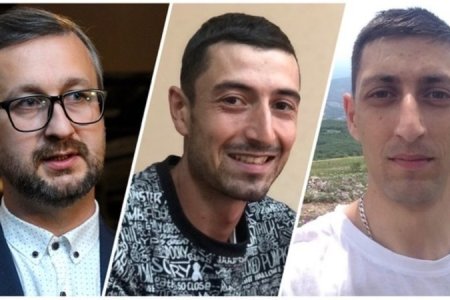
Russia wants to sentence Nariman Dzhelyal, internationally renowned Crimean Tatar Mejlis leader, journalist and civic activist, to 15 or 20 years for a fictitious act of sabotage with the only ‘evidence’ provided by equally fictitious anonymous witnesses. The ‘judges’ are clearly aware that the case is fabricated as they constantly disallow questions proving that the ‘witnesses’, who may well not know any of the three defendants, are lying.
The latest hearings, on 20 and 22 April, were a classic of the genre. Dzhelyal, Asan Akhtemov and his cousin, Aziz Akhtemov, are accused of organizing an act of sabotage to a gas pipe in Perevalne and other related charges. The only ‘evidence’ for these charges comes from three so-called ‘secret’ or ‘anonymous witnesses’, whose identity is concealed from the defence, despite the lack of any proof that these individuals would be in any danger if they appeared openly.
Dzhelyal’s lawyer, Nikolai Polozov reports that on 20 April, the ‘secret witness’, under the pseudonym ‘Danilov’, could reel off only the testimony set out in the original interrogation protocol, but demonstrated stunning ‘lapses of memory’ when asked any other questions despite claiming to have known Dzhelyal since 2010. There were also long pauses during which ‘Danilov’, who is speaking from another room, was clearly consulting with somebody, probably from the Russian FSB.
All of this suggests, Polozov writes, that ‘Danilov’ is not a genuine witness, but either an agent or employee of the Russian enforcement bodies, giving false testimony to make up for the lack of any real evidence against the defendants.
In this, ‘Danilov’ as well as the previously questioned anonymous ‘witness Baidachny’, were actively abetted by the ‘judges’ at the Russian-controlled ‘High Court’ in Crimea: Viktor Ivanovich Zinkov (presiding); Aleksei Viktorovich Kozyrev and Sergei Nikolaevich Pogregniak, During the hearing on 25 April, the ‘court’ disallowed twenty questions from the defence, aimed not at exposing his identity, but at demonstrating his lack of knowledge about the events he purportedly witnessed. Polozov notes that the defendants themselves, and the defence, have on many occasions applied for the removal of presiding ‘judge’ Zinkov for such behaviour.
One particularly damning moment came over ‘Danilov’s’ claim that he was present when Dzhelyal spoke by telephone in the Crimean Tatar language with somebody called Riza and allegedly mentioned some business and a person called Asan, and his cousin. He then ‘remembered’ with extraordinary detail that on 26 or 27 August he had been present when Dzhelyal supposedly phoned ‘Riza’ and spoke of it having “worked well with the pipe”. It was then asserted that, after Dzhelyal’s arrest, ‘Danilov’ had put 2 and 2 together and got in touch with the FSB.
Asked by the defence. ‘Danilov’ claimed to know Crimean Tatar well enough to be able to translate Dzhelyal’s words for himself and for the FSB. At this point, the defence asked him what the word for ‘pipe’ is in Crimean Tatar. This is of critical importance given the apparently incriminating nature of his ‘testimony’, yet the court disallowed the question. There were several other evident (some primitive) mistakes as well, and the court disallowed another question, regarding the Mejlis, or self-governing body, of the Crimean Tatar people which would also have given the lie to ‘Danilov’s’ assertions about his alleged acquaintance and shared activities with Dzhelyal.
Dzhelyal also pointed out in court that on 26 August, he had returned to Crimea from the Crimea Platform in Kyiv and had not spoken with anybody by telephone in somebody else’s presence, while the following day, he had been with his family all day. Furthermore, the allegation made no sense. Why would he have waited until he was back in Crimea to speak with this person ‘Riza’ in the presence of ‘Danilov’ when, according to ‘Danilov’ himself, this ‘Riza’ was in mainland Ukraine from where Dzhelyal had just come?
‘Danilov’ also gave another answer which clearly demonstrated the falsification in this case. Asked by the defence, he claimed that he could not remember when he approached the FSB, but that it had been some time in September or October, after he heard of Dzhelyal’s arrest on 4 September 2021. Polozov has published the relevant excerpts showing that a protocol from preliminary questioning of an individual identified as ‘Danilov’, supposedly from 11 a.m. on 4 September 2021, was used by the FSB investigator to justify the application to the court for Dzhelyal’s (arrest and) detention. “The text of this protocol of the questioning was later copy-pasted into the protocol of what was already the interrogation of ‘Danilov’ as witness.” The FSB did not, however, see the need to ensure the same signature on the two protocols, purportedly from ‘Danilov’.
Polozov has also demonstrated that FSB ‘investigator’ Vladislav Sergeevich Stradetsky lied in court, under oath, when he asserted that his sole activity in the case had been the ‘questioning’ of Asan Akhtemov.
Once again the ‘court’ collaborated with the prosecution, by rejecting the defence’s application to have the document showing the first ‘Danilov’ brought in for examination.
Torture, retracted testimony and three ‘secret witnesses’
There are legitimate doubts as to whether there even was an act of sabotage on 23 August 2021, and there are literally no grounds for suspecting any of the three defendants.

Five Crimean Tatars were seized after armed raids on 3 and 4 September 2021. Eldar Odamanov disappeared after the FSB appeared at his home, early on 3 September. Then, during the following night, armed raids were carried out of the homes of Asan and Aziz Akhtemov, and of Shevket Useinov. They came for Nariman Dzhelyal in the morning of 4 September.
It was clear that Dzhelyal was the target, and that the timing was no accident. Dzhelyal, the highest-ranking leader of the Mejlis in occupied Crimea, was taking part in the Crimea Platform on 23 August, the day of the supposed ‘sabotage attack’, and had returned to Crimea despite serious fears that Russia would carry out reprisals for his participation in this international initiative.
All of the men disappeared, with the Akhtemovs held incommunicado for almost ten days and only provided with access to lawyers after the European Court of Human Rights intervened. During that period both Asan and Aziz Akhtemov gave videoed ‘confessions’ which they retracted, as extracted through torture, as soon as they were allowed access to real lawyers.
After being effectively abducted, and held incommunicado for three days, the other two men, Odamanov and Useinov, were jailed for 10 and 15 days on absurd charges, quite unrelated to the armed raids on their homes.
The final charges against Dzhelyal and the Akhtemovs are of carrying out an act of sabotage as part of an organized group (Article 281 § 2a (carrying a sentence of from 12 to 20 years), and of the illegal purchase, transfer or possession of explosives as part of an organized group (Article 222.1 § 4, with a sentence of from 10 to 15 years). On 8 November, an additional charge was added, of smuggling an explosive device, as part of an organized group (Article 226.1 § 1, carrying a sentence of from 7 to 12 years’ imprisonment); and of ‘causing considerable material damage to the Crimean gas network (to the tune of around 1,425 USD). Polozov reported in December that they are also claiming that (the alleged) cut in gas to the military unit that supposedly ensued constituted “an attack on the Russian Federation’s defence capabilities”. Polozov noted that the indictment was reminiscent of the material used during Stalin’s Terror.
There has been international condemnation of this political show trial from, among others, the United States; the European Union; the Parliamentary Assembly of the Council of Europe and Human Rights Watch. Worth noting too that the UN Secretary General has been scathing about the methods used in occupied Crimea, including the use of ‘anonymous witnesses’ and unsavoury role in this played by the ‘court’ (UN report slams Russia’s use of torture and kangaroo courts in occupied Crimea )
See also information about the torture, threats and other methods used by the FSB to extract ‘witness testimony’ here: Russia escalates use of torture to fabricate ‘evidence’ against imprisoned Crimean Tatar leader Nariman Dzhelyal



